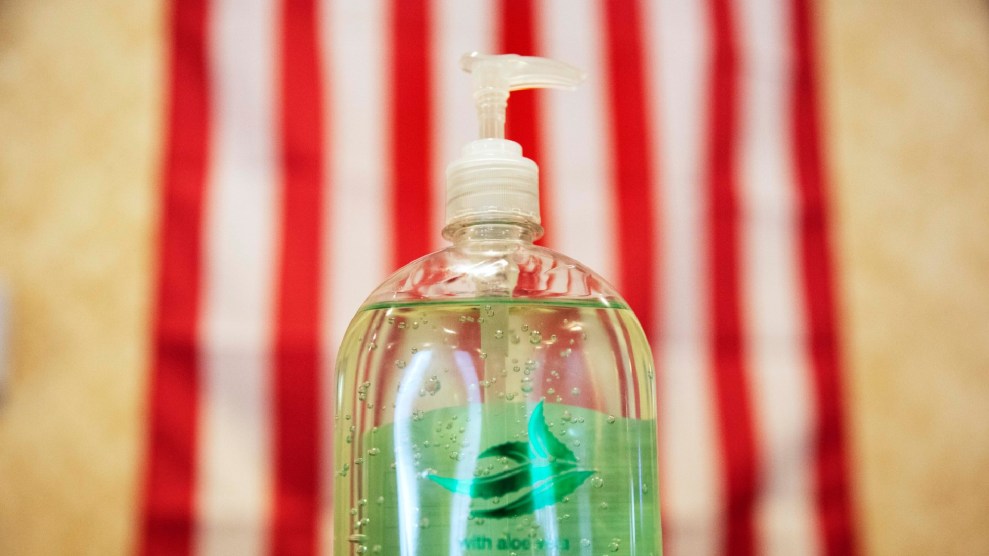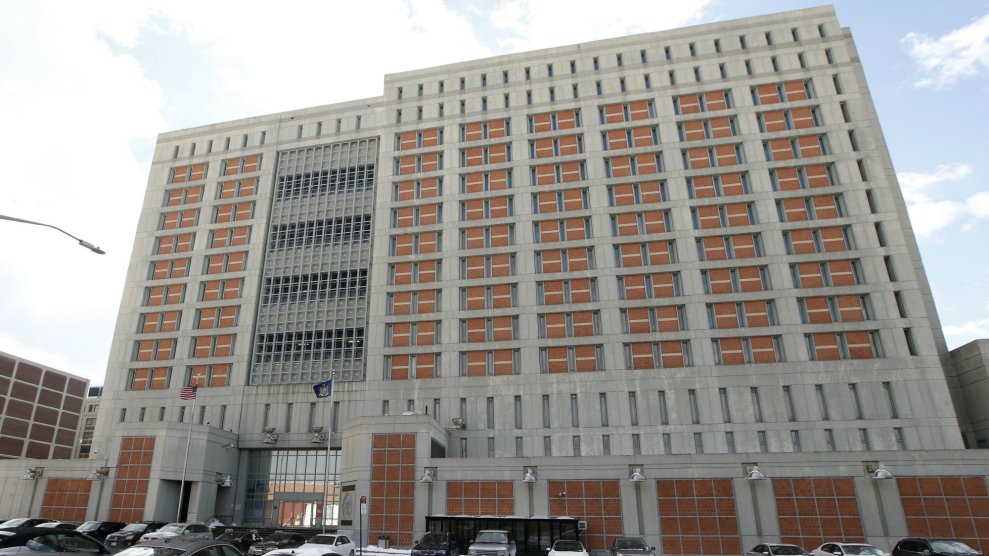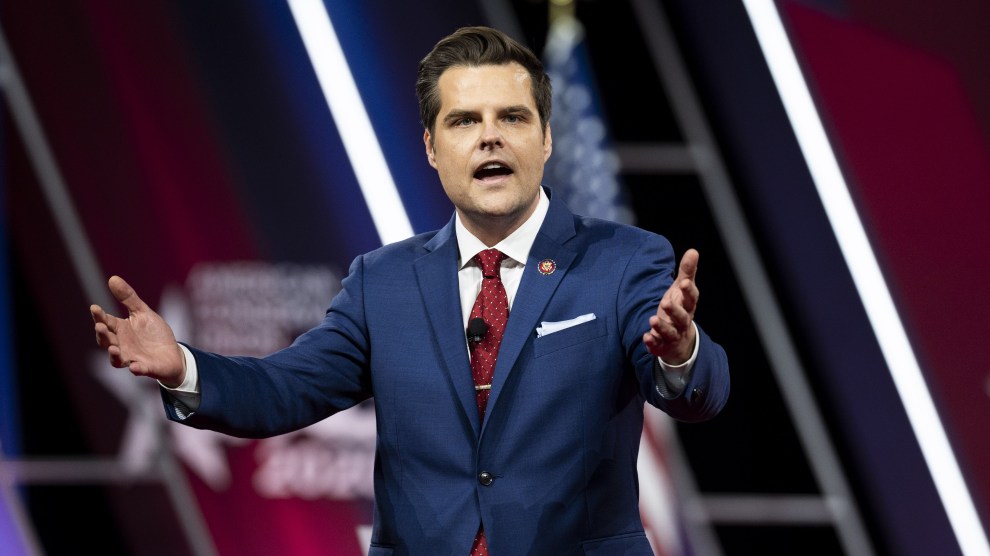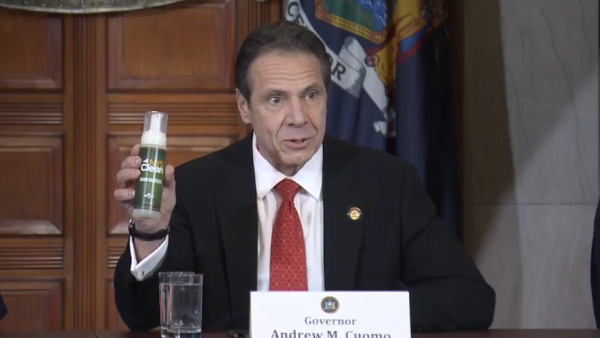
David Goldman / AP Photo
This story was published originally by ProPublica, a nonprofit newsroom that investigates abuses of power. Sign up for The Big Story newsletter to receive stories like this one in your inbox as soon as they are published.
It’s tempting, especially now, to buy one of the many hand sanitizers whose label says it “kills 99.99% of illness causing germs.” But that does not mean the product will protect you against the novel coronavirus.
The Centers for Disease Control and Prevention recommends rubbing on hand sanitizers with at least 60% alcohol when you aren’t able to wash your hands. Huge pumps and multipacks of bottles are flying off store shelves. But “alcohol-free” products—which are not recommended by the CDC—are also getting snatched up in the consumer frenzy.
Some of the hand sanitizers made by the brands Purell and Germ-X rely on benzalkonium chloride instead of alcohol as the active ingredient. Such non-alcohol antiseptic products may not work as well for many types of germs, the CDC says, or may merely reduce the growth of germs rather than killing them. They may be better than nothing, experts say. But people are buying them without knowing the difference.
Alcohol-Free Hand Sanitizers Are Selling Out, Despite Not Being Recommended by the CDC
These alcohol-free products are selling out, with internet price-gouging in full swing. At times, it can be hard to tell, by looking at the listings, that they’re different from the kind the CDC recommends.
Purell Hand Sanitizing Wipes have jumped in price on Amazon.com from $11.88 in January to $79.99 on Wednesday afternoon before jumping to $199.99 on Wednesday night, according to the price tracker Keepa.com. They are currently sold out.
The front of the package doesn’t mention that it’s alcohol-free; the back includes small print that lists benzalkonium chloride as the active ingredient and the label “alcohol-free formula.” Nowhere on the Amazon product listing does it say it’s alcohol-free.
Germ-X Alcohol-Free Foaming Hand Sanitizer is also sold out on Amazon, with prices surging from $10 in mid-January to $49.95 last Friday, according to Keepa.com.
On eBay, 6 fluid ounces of Purell’s alcohol-free sanitizer—the equivalent of three-quarters of a cup—had a $55 price tag on Thursday night.
Amazon officials have said they are monitoring listings for price gouging, blocking or removing those they suspect of it. Ebay announced Friday that it was banning listings for hand sanitizers, masks and disinfecting wipes, and that it will “quickly remove” listings other than books that mention coronavirus or COVID-19, the disease it causes.
If you type in “coronavirus hand sanitizer” on Amazon, the results include hand sanitizers made by different companies that don’t contain alcohol. Amazon had not responded to questions about alcohol-free hand sanitizers by the time of publication.
Customers seem to be confused. One gave Purell’s alcohol-free, benzalkonium chloride-based hand wipes five stars, writing: “Honestly these wipes were a life saver. Due to the corona virus and me traveling to Vietnam, I bought a pack… I used these on flights, utensils before eating and seats before sitting. It gave me [a feeling] of safety…”
Alcohol-Free Hand Sanitizers Are Better Than Nothing. None Are as Good as Washing Your Hands.
At a time when all hand sanitizers are in short supply, the benzalkonium chloride products are better than nothing, said Emily Landon, an infectious diseases specialist at the University of Chicago Medicine. She said the CDC recommendation for hand sanitizers is based on the fact that 60% alcohol kills “all of the coronaviruses we know about.” A sanitizer with benzalkonium chloride as the active ingredient is “not as good,” because we don’t know as much about it, she said. As a physician, mother and infection-control expert, she called alcohol-based products her “first choice” for hand sanitizers.
Labels for the Purell and Germ-X alcohol-free hand sanitizing products that contain benzalkonium chloride are vague about which germs they work against.
ProPublica asked Kelly Ward-Smith, the spokeswoman for Gojo Industries, the company that invented Purell, what the product labels mean when they say they kill “99% of most illness causing germs.” She declined to answer, saying in an email that because this article is about coronavirus, the FDA could interpret any answer to violate its rules. The company, which also sells hand sanitizers that contain alcohol, does not appear to be marketing any of them for protection against COVID-19.
ProPublica reached out for comment to Vi-Jon, the company that makes Germ-X, but did not get a response. They also sell alcohol-based products and also don’t appear to be marketing any of their hand sanitizers for use against the novel coronavirus.
Don’t Waste Your Vodka
The shortage of hand sanitizers has led consumers to take extreme measures, brewing their own elixirs of alcohol and aloe vera gel. Landon said the “homemade Pinterest recipes” she’s seen are no good, as people are using whiskey or vodka that doesn’t contain enough alcohol to be effective. The World Health Organization’s guidelines for making hand sanitizers require 96% ethyl alcohol.
Taking its consumer mission to heart, Tito’s Handmade Vodka tweeted a warning to its customers on Thursday that its product didn’t contain enough alcohol to sanitize effectively: “Per the CDC, hand sanitizer needs to contain at least 60% alcohol. Tito’s Handmade Vodka is 40% alcohol.”















